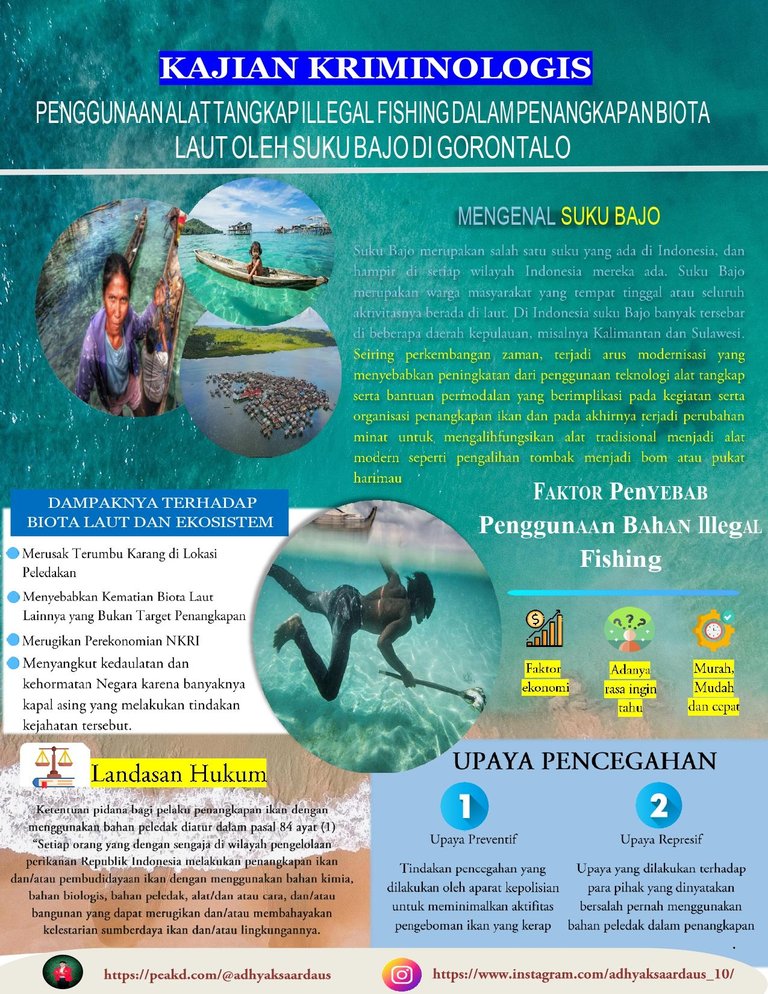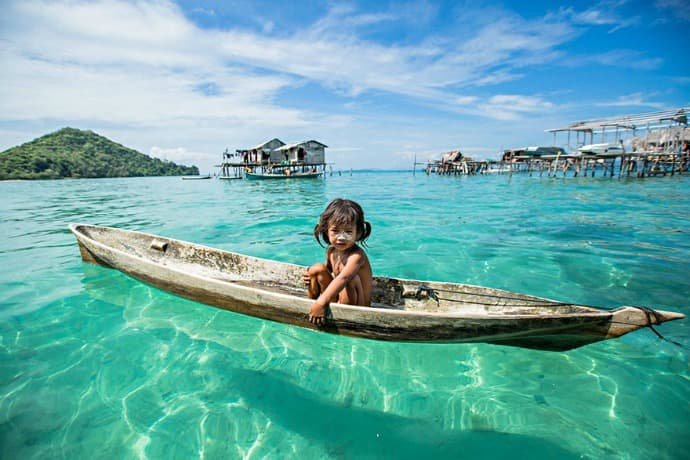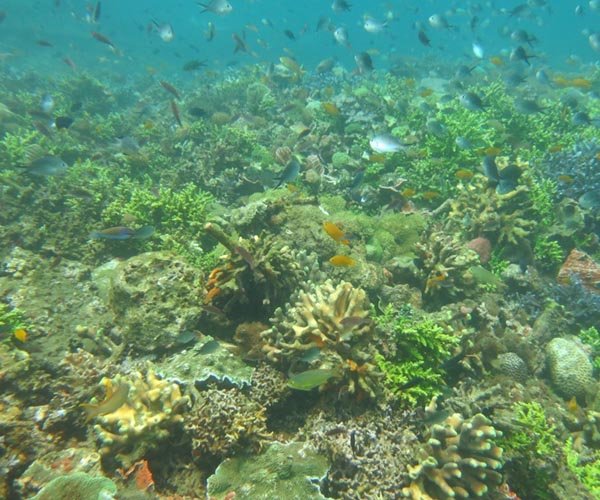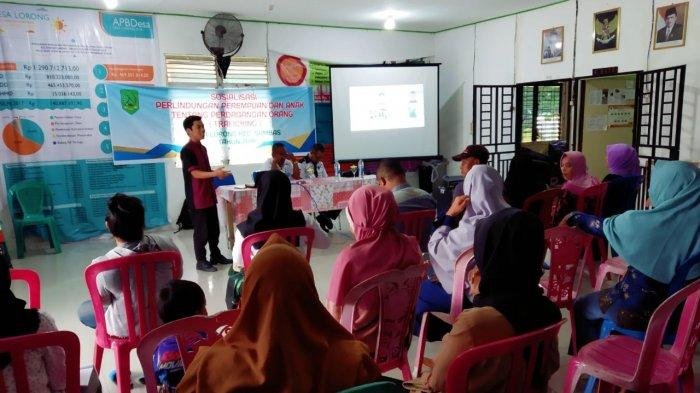
BACKGROUND : Knowing the Bajo Tribe as a Unit of Wealth of Various Tribes in Indonesia
The Bajo tribe is one of the tribes in Indonesia, and in almost every region of Indonesia they exist. The Bajo tribe is a community member whose residence or all of their activities are at the sea. Although the Bajo people live in the sea, it is possible that they have their own expertise. At first, Bajo were on a boat called a bido, living on the move by moving to different places following the location of the fishing community. Some residents still use simple methods of catching fish that live in the sea. The tools used to lure fish use a type of cotton thread without a fishing line, which they call bina.

Along with the times, modernization has occurred which has led to an increase in the use of fishing gear technology and capital assistance which has implications for fishing activities and fishing and finally there is a change in interest in converting traditional tools into modern tools. One concrete example that can be seen is the increasingly scarce availability of construction equipment which is increasingly being replaced by sophisticated machines with digital technology. Another effect that can be generated from this modernization effect is that the social life of the Bajo people who work as fishermen on the high seas can influence their work patterns and mindsets to streamline their fishing gear into multifunctional tools as well as the use of fish explosions that can catch and kill fish organs. at the same time to make it easier to catch.
According to the Deputy of the Agency for the Assessment and Application of Technology, Dr Jana Tjahja Anggadiredja, the use of explosives in fishing by the Bajo tribal community can certainly preserve the potential of existing resources. Fishing with explosives can kill fish without discrimination, corals and invertebrates without shells.
Damage to Marine Biota Due to the Use of Illegal Fishing Materials
Illegal fishing is a mall practice activity in catching fish or using fishery resources that legally violates the law. Illegal fishing activities are mostly carried out by foreign-flagged vessels, making it difficult to identify and catch. State losses due to illegal fishing by foreign fishing vessels are estimated to increase in line with the increasing number of cases of violations in the fisheries sector. Arrest by means of destruction (destructive fishing) is also an act of illegal fishing where fishing activities are carried out using cyanide and potassium bombs which damage marine biota and coral reefs.
Using explosives or fish bombs to find fish is the easiest way. Fish bombs can be easily made by many people. Simply by providing a few bottles filled with potassium nitrate mixed with gravel or ammonium nitrate mixed with kerosene, fish bombs can be used immediately to get fish quickly. The explosive power of the fish bomb will make the fish die in an instant, even the thrust of gravity and the pressure under water will be able to damage the fish bladder and can kill fish that are quite far from the reach of this fish bomb. In a matter of minutes the catch can be obtained without having to work hard.

The impacts of damage caused by explosives are:
- Damage to coral reefs around the blast site
- Causes the death of other marine biota that are not the target of catching
- Causes damage and disruption of the ecosystem under the sea
- Harming the economy of the Republic of Indonesia
- Concerning the sovereignty and honor of the State due to the large number of foreign ships committing these crimes.
- The domestic fishery industry is experiencing a shortage of raw materials
Legal Studies and Legislation
Based on the provisions of Law Number 45 of 2009 there are several types of offenses in fisheries which are contained in articles 84 to 101. The offenses are pollution offenses, destruction of fish resources and fishing using explosives, offenses for managing fish resources and fishing business offenses without a permit. In this paper the author will examine the offense of pollution, destruction of fish resources and fishing using prohibited materials. Criminal provisions for perpetrators of catching fish using explosives are regulated in Article 84 paragraph (1) whose formulation is as follows: "Any person who intentionally in the fishery management area of the Republic of Indonesia catches fish and/or cultivates fish using chemicals, biological materials, explosives, tools/and methods, and/or buildings that can harm and/or endanger the sustainability of fish resources and/or the environment as referred to in Article 8 paragraph (1), shall be punished with imprisonment for a maximum of 6 (six) years and a maximum fine of Rp. 1.200.000.000,00 (one billion two hundred million rupiah).” Furthermore, it is also regulated in Article 84 paragraph (2) to paragraph (4) which mentions criminal provisions for perpetrators of catching fish with explosives by the captain or ship owner and his subordinates, fishing boat owner, fishing company owner, person in charge of fishing company, company owner. fish cultivation, and the person in charge of fish culture companies with different criminal provisions. For fishery companies or fishery cultivation companies, the criminal provisions are greater, namely being sentenced to a maximum imprisonment of ten (10) years and a maximum fine of Rp. 2,000,000,000 (two billion rupiah).

In the context of optimal, responsible and sustainable use of marine and fishery resources, prevention of fisheries crime has been carried out by involving the community. The forms of prevention that have been carried out by the community gathered in Community Monitoring Groups in several villages and sub-districts inhabited by the Bajo tribe in coastal areas are:
- Carry out preventive activities in their respective areas.
- Report to law enforcement officers if there are allegations of violations or criminal acts in the field of fisheries.
- Arrest (if caught red-handed) and hand over the offender (including the evidence) to law enforcement officials.
- Disseminate information to the public about the functions, disturbances/threats, and the preservation of marine resources.
- Play a role in preventive operations when carrying out activities as fishermen.
Efforts to Combat the Use of Bombs and Other Illegal Fishing Materials in Fishing carried out by the Bajo Tribe community
- Preventive Efforts
Preventive efforts are prevention efforts carried out by the police to reduce Illegal Fishing activities that are rampantly carried out:
a. Socialization or Counseling Socialization or counseling is centered on communities in fishing villages who are indicated to be carrying out fish bombing activities about the dangers of fish bombs to themselves and the marine ecosystem. Through this socialization or counseling, the police hope that people in fishing villages who are indicated to use explosives in catching fish know about the dangers of the fish bombs not only for themselves but also for the preservation and survival of marine life. Through this socialization, the police also explained about the law that regulates the prohibition of the use of explosives in fishing, namely Law Number 31 of 2009 concerning Fisheries. Precisely in Article 8 and the criminal provisions in Article 84.

Counseling is a means of uniting the mind in dealing with problems
b. Doing Routine Patrols Carry out patrols which are carried out approximately two times a month and on important days such as during election moments. This patrol is centered on fishermen who carry out fish bombing activities and foreign ships that smuggle sun stamp fertilizer as the main ingredient in making fish bombs. In terms of this patrol activity, the police are looking for places that have the potential for fishermen using fish bombs and visiting islands that are suspected of being places for fishermen who use fish bombs. In addition, they are also looking for foreign ships that come from outside the area to sell sun stamp fertilizer. Based on their information, they carry out buying and selling transactions in the middle of the sea or on hidden islands. It is said that the sun stamped fertilizers that are traded are smuggled from neighboring countries, namely from Tawau (Malaysia)
- Repressive Efforts
Repressive efforts are in the form of actions taken against fishermen caught red-handed using explosives in fishing. those fishermen who are caught will be legally processed and subject to sanctions in accordance with existing provisions
.
.
.
.
Source :
Survival Strategy of Traditional Bajo Fishermen in Fulfilling Family Needs
Damage to Marine Biota Due to Fishing Using Explosives
Sinking of Illegal Fishing Ships in Indonesian Territory in the Perspective of International Law. Journal of Maritime Law
Fisherman Community Response to Fisheries Modernization (Case Study of Bajo Fishermen in Lagasa Village, Muna Regency, Southeast Sulawesi Province)
Social Mobility of the Bajo Tribe in Tinakin Laut Village, Banggai District, Banggai Laut Regency
Fishing with Bombs in the Coral Reef Area of Arakan and Wawontulap Villages
The Crime of Fish Theft (Illegal Fishing) Using Tiger Trawls (Case Study Decision Number 1516 K/Pid.Sus/2011
Criminal Action for Fishing Actors Using Explosives (Dynamite Fishing).
interesting topic
thanks pal, i think i'd like to post like this sometimes😁